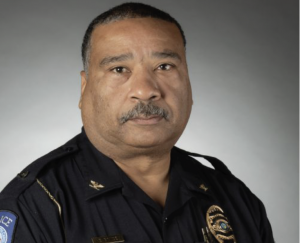Jennifer Acevedo Lule
Contributor

Eric Boyce, UNCA Police Chief
The three most common criminal offenses at UNC Asheville, possession of drugs, paraphernalia and larceny, are at an all time low due to the reduced number of students on campus this semester, said UNCA police chief Eric Boyce.
“Our numbers are very much different than what they were last year. You could take a look at our annual security of our safety report board and can see the drug alcohol arrest of referrals for the past three years. And so, what we’ve seen this year is actually a reduction because we don’t have a lot of students,” Boyce said.
Vice Chancellor Bill Haggard said marijuana is the only drug UNCA has had to deal with this year.
“I’m pretty sure that this academic year, the most serious drugs we’ve had is the simple possession of marijuana and other than that, I do not recall any cases involving possession with intent to sell. It’s just been that simple possession and I don’t recall any cases this year where we’ve had cases involving a more serious drug than marijuana,” Haggard said.
Police officers always take the confiscated drugs found during an incident of possession and send them out to a lab for analysis or place them in evidence, Boyce said.
“We want to make sure that no additional drugs are in the area and that we try to identify where the students receive the drugs. We want to try to identify who is distributing those drugs to our community.” he said.
For students who struggle with drug related issues, Dean of Students Jackie McHargue said there are resources available to students to get the necessary help they need to recover from any addictions they might be facing.
“I want them well, and so it really shocks students when they will come in and talk about an addiction issue or a real significant issue and we’re like, all right, let’s figure out how to get you through this,” McHargue said. “I really can’t think it takes a lot of courage to wrestle with those things now and get yourself in a healthier place.”
When it comes to drug possession and how that affects students, McHargue said to always reach out to get help from campus police or a residential assistant and to not be afraid of getting in trouble.
“At the end, we are more worried about the student being well than anything else. For starters we have a policy that if that student has voluntarily or involuntarily had too much to drink or has taken drugs and they need help or help for somebody else, we have this amnesty policy that says you’re not going to get in little disciplinary trouble for the behavior,” McHargue said. “We want you to call for help for yourself or for someone else because we don’t want a student to die because people were afraid they were getting in trouble. That’s just not what we want. We want to reach out, get help for themselves or get help for someone else.”
According to Haggard, other crimes students should be aware of include a series of theft of motor vehicle parts.
“I remember seeing two separate thefts of motor vehicle parts passed by dawn but I don’t know the details of those two cases. For students who park remotely, we make sure there’s good light on campus and safe walkways.
We normally do an annual safety walk at night to get feedback from students. We didn’t do it last year because of COVID-19,” Haggard said. “We have blue light call boxes throughout the campus and in some of our remote parking lots, those lights have a surveillance camera as part of that tower. That gives us surveillance camera information as well. If students are concerned about the safety at the parking lot they can also call campus police and officers will be happy to come by and pick them up and drive up to their destination.”
Police officers had reports of catalytic converters being taken out of the vehicle recently, but that’s all they have, according to Boyce. To see more statistics on the crimes on campus, check out the crime log online.


















